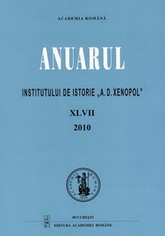Memoria culturală – istoria şi implicaţiile unui concept
Cultural Memory – The History and Implications of a Concept
Author(s): Mihai ChiperSubject(s): History
Published by: Editura Academiei Române
Keywords: cultural memory; anthropological and semiotic theories; socio-cultural context; paradigm
Summary/Abstract: The study represents a review for the Romanian public of the key points in the debates with a terminological and epistemological aspect, which took place in the past two decades, regarding the urgency of a study concerning memory in the historiography field. We will take into account the compatibilities, the consummations, as well as the dissensions or the semantic pitfalls available in three large academic directions of theoretical elaborations: the French direction – mémoire collective (Maurice Halbwachs, Pierre Nora, Henry Rousso, Paul Ricoeur), the Anglo- Saxon direction – collective memory, cultural memory (Barry Schwartz, Paul Connerton, Patrick H. Hutton, Jeffrey K. Olick, David Lowenthal, John Bodnar, Jay Winter, Richard Terdiman, John R. Gillis, David Lowenthal, Andreas Huysse, Eric Hobsbawm) and the German direction Kulturelles Gedächtnis according to Heidelberg circle (Jan Assmann şi Aleida Assmann, Dietrich Harth, Jürgen Reulecke etc.). The study is proposing to analyse the break between memory and history: a critique of Pierre Nora paradigm; the past as the prisoner of the present and the present as the inheritor of the past, the relation between historians and the memory; the true meaning of posing the challenge to write history outside traditions or any influence memory would excercise. The present commentary is insisting on the considerations brought by Astrid Erll and Ansgar Nuenning (Cultural Memory Studies: An International and Interdisciplinary Handbook, 2008) and is in favour of using the concept of “cultural memory” replacing this way the term of “collective” or “social” regarding memory. According to the anthropological and semiotic theories, culture can be defined as three dimensional, involving the social aspect (the individuals, social relations, institutions), the material (artefacts and media), and mental aspects (defined culturally speaking as mentalities). If seen from this perspective, cultural memory can represent an encompassing term for the “social memory”, as a primary study source for social studies, for “material memory”, the main point of interest for the media and literary studies, as well as for cognitive memory, the terrain for psychological and neuroscience expertise. These nominations are of course only theoretical. However, the three dimensions are thoroughly involved in the creation of the cultural memory transcending thus their own limitations. Media, practices, myths, monuments, historiography, ritual, the conversational memory, the structure of cultural knowledge can all be resumed as cultural memory. Cultural memory emphasises its relation with memory on the one hand and the socio-cultural context on the other.
Journal: Anuarul Institutului de Istorie »A.D. Xenopol« - Iaşi
- Issue Year: XLVII/2010
- Issue No: 47
- Page Range: 119-142
- Page Count: 23
- Language: Romanian

